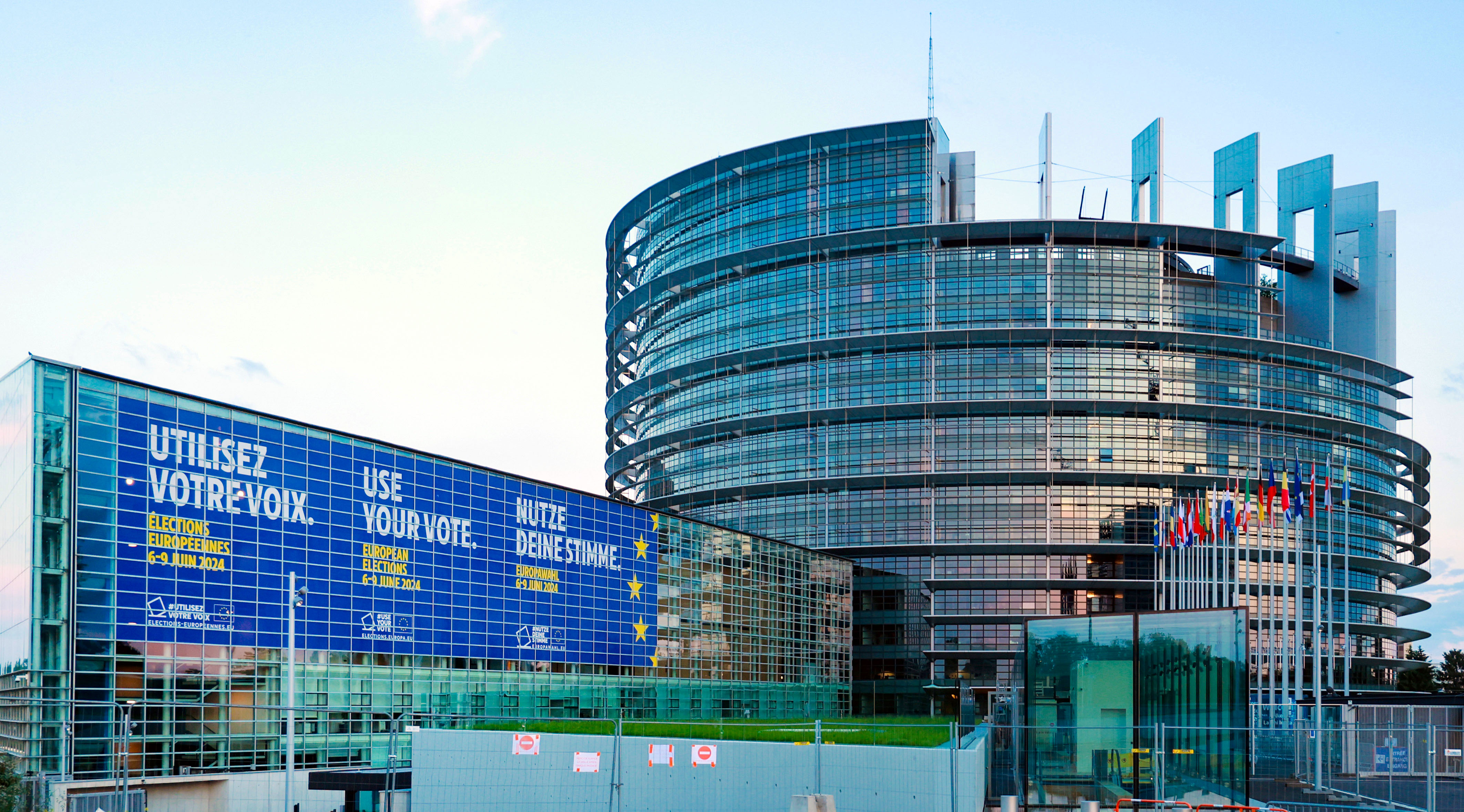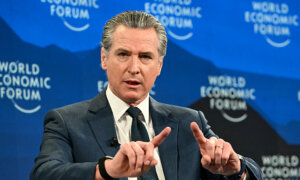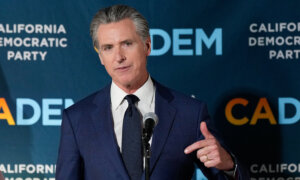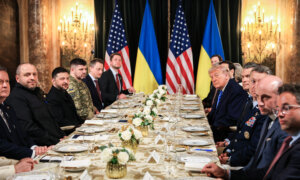Predictions that right-wing groups gain significantly more seats in the current European Parliament elections won’t necessarily translate into a “definite change in the direction of European policy,” said Marcin Kedzierski, assistant professor at the department of international relations at the Cracow University of Economics in Poland.
The elections began on June 6 and wrap up late June 9.
The European Council on Foreign Relations predicts that the biggest winner will be right-wing groups which would give them more influence over the European Union’s (EU’s) policies.
Right-wing parties, commonly called Euroskeptisc, can count on winning about 25 percent of the vote depending on the turnout, Mr. Kedzierski predicts.
“The lower the turnout, the better the results for those Euroskeptics, because [their voters] are more mobilized to go to the polls,” he told The Epoch Times.
In most countries, European elections draw fewer voters than national elections, Mr. Kedzierski said.
Even in a scenario in which right-wing candidates get 30 percent of the vote, they will not form a governing coalition in the European Parliament, Mr. Kedzierski said.

Marcin Kedzierski, Ph.D., assistant professor at the Department of International Relations at the Cracow University of Economics in Poland. (Courtesy of Marcin Kedzierski
“Because this coalition will be formed, as always, by the center-right from the European People’s Party, the center-left from the Social Democratic Party,” the liberals from Renew Europe, and the Greens, he said.
Renew Europe is the third largest political group in the European Parliament.
Role of the European Parliament
The political system of the EU is complicated because the union acts a bit like a state but its parliament is not like a national parliament such as the U.S. Congress, Mr. Kedzierski said.
The European Union’s laws are jointly made by the European Parliament—whose members are voted in—and the Council of the European Union, composed of the national ministers from each government of the bloc’s 27 member nations, Mr. Kedzierski explained.
These two institutions must reach an agreement on specific law provisions, he said.
In the past, the European Parliament acted only as an opinion-giving body and did not make any decisions, Mr. Kedzierski said. But its role evolved from election to election and the parliament gradually gained more and more influence.
The system of influence in the EU consists of three intertwining levels: member states including big economies like Germany, France, and Italy; European institutions like the parliament and European Commission; and the lobbying level, such as businesses, nongovernmental organizations, and others, Mr. Kedzierski said.
Integration
European integration is the process of economic, political, and social integration through the cooperation of European countries primarily advanced through the European Union.
The election results may indicate any new trend or direction of EU integration, according to Mr. Kedzierski.
The EU has been through periods of accelerated integration and slowdowns in the integration process since its inception, he said.
Slowdowns were usually caused by crises that plagued Europe such as the oil crisis of the 1970s, the global financial crisis in 2008, the Greek debt crisis after entering the eurozone, the illegal immigration crisis in 2015, and the war in Ukraine, Mr. Kedzierski said.
“It is clear that this period of crises is somehow coming to an end and we are entering that moment when it will be possible to give a new impetus, a new acceleration, to the European integration,” he said.
“This election will tell us a little bit whether it will succeed or fail.”
The key countries of Germany and France “have always decided about the shape of the European integration process,” Mr. Kedzierski said.
However, the policies of both countries differ, he said.
The French policy is that “what is good for France must be good for the European Union,” Mr. Kedzierski said. The German policy is that “what’s good for the Union is good for Germany” but what’s good for the Union is determined by Germany.
Political union means de facto fiscal union for EU members, he said. “The Germans know that it’s not the French, it’s the Germans that will have to pay.”
“Since Germany has gained the most from integration into the eurozone, [the European common currency,] the expectation is … they should share a little with those poorer countries in the Union that are losing today from integration in the eurozone,” Mr. Kedzierski said. “But Germany is not interested in that.”

European Commission President Ursula von der Leyen arrives for the European Union leaders summit in Brussels, Belgium, on May 30, 2022. (Johanna Geron/Reuters)
Multi-Speed Europe
The idea of deepening European integration appeared in the 1950s. But only at the end of 1990 did an approach to integration known as “multi-speed Europe” develop, according to Mr. Kedzierski.
The concept assumes that different member states integrate at different paces into the Union. For example, member countries may be at different levels of integration within the eurozone or the border-free Schengen area.
“For now, we have two unofficial categories of memberships,” Mr. Kedzierski said. “There are more integrated [countries] and less integrated countries.”
If Ukraine joins the EU, it may mark the beginning of a third category, he said.
The question of whether to strengthen the EU by deepening the integration between members or by enlarging the union by admitting new member states has been debated for a long time.
Mr. Kedzierski said it’s possible to have both.
In February, the European Parliament adopted a resolution on “Deepening EU integration in view of future enlargement.”
Charles Michel, President of the European Council, said in November 2023 that the European Union must be ready to welcome Ukraine by 2030.
“This does not mean that Ukraine will then enter the Union, but [the EU] is to be ready to admit Ukraine,” Mr. Kedzierski said.

European Council President Charles Michel holds a press conference following an EU leaders summit to discuss the fallout of Russia's invasion in Ukraine, at the Palace of Versailles near Paris, on March 11, 2022. (Ludovic Marin/AFP via Getty Images)
In addition, six Balkan countries, Georgia and Turkey, have been granted candidate status and are currently reforming their national laws to comply with EU standards, according to the EU website.
Euroskepticism
The members of the right-wing political groups in the European Parliament often hold critical views of the EU and European integration. Mr. Kedzierski suggested that this stems from the growing public disillusionment with the EU.
He said, quoting World Bank economist Branko Milanovic, that “globalization has admittedly made many people in the world richer, but the group that has lost the most is the middle class in developed countries.”
Much of the voter base in EU countries like Germany, France, Italy, or Spain have the perception “that things are not going in the right direction,” Mr. Kedzierski said.
Young people in their twenties and thirties firmly believe that they will be worse off than their parents, he said.
“There is a belief that the European Union has solved the problems of Europeans over the years and raised the standard of living. [But] today there is a public perception in Europe, especially in Western Europe, that the European Union is not so much improving opportunities as worsening them.”
Young people, not seeing the EU addressing their problems, have started to look for solutions in their nation states, Mr. Kedzierski said.
“This is behind this renaissance of national parties—whether in Germany, France, Italy, or other countries in the old Europe.”












